-
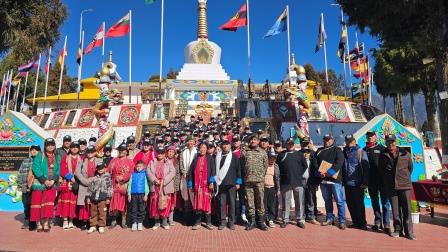 Veterans' Day celebrated with reverence and pride in Tawang
Veterans' Day celebrated with reverence and pride in Tawang
-
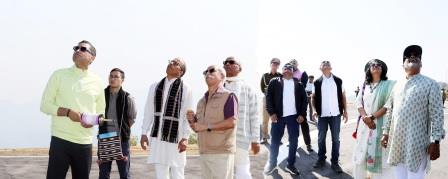 Governor participates in kite-flying festival
Governor participates in kite-flying festival
-
Arunachal Pradesh set to receive 152 NCC Cadet Volunteers as…
-
Mein inaugurates hostel building at Pali Vidyapeeth, Announces support
-
State-Level Workshop on Career Guide Book and “My Career Advisor”…
-
Farmers trained on agro-techniques focusing on large cardamom
-
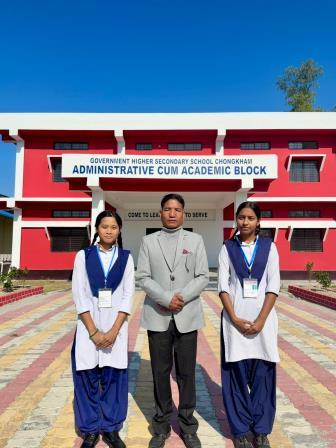 Namsai students to represent Arunachal Pradesh as Special Guests at…
Namsai students to represent Arunachal Pradesh as Special Guests at…
-
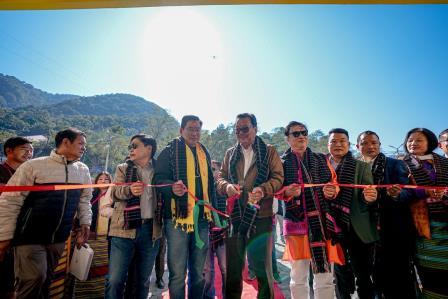 DyCM inaugurates Parshuram Kund Mela on Makar Sankranti
DyCM inaugurates Parshuram Kund Mela on Makar Sankranti
-
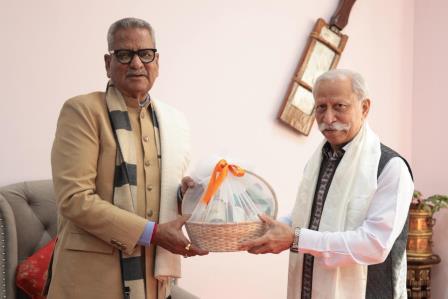 Arunachal Pradesh Governor meets Sikkim counterpart
Arunachal Pradesh Governor meets Sikkim counterpart
-
Indian Army’s swift response averts major mishap
Doimukh, Nov 12: Union Minister of Communications and Development of North Eastern Region (DoNER), Jyotiraditya M. Scindia, interacted virtually with a 43-member delegation comprising 39 students and 4 teachers from Goa and Uttarakhand, who are visiting Rajiv Gandhi University, Doimukh, Arunachal Pradesh, under the first batch of the “Ashtalakshmi Darshan” programme being held from November 1 to 14. The interaction formed part of the Ministry’s ongoing efforts to strengthen cultural exchange, educational collaboration, and emotional integration between the youth of India and the North-Eastern region.
The Ashtalakshmi Darshan programme, initiated by the Ministry of DoNER, aims to provide students and educators from different parts of India with a deeper understanding of the North-East’s culture, heritage, development journey, and potential. Derived from the concept of the “Ashta Lakshmis,” representing the eight North-Eastern states—Arunachal Pradesh, Assam, Manipur, Meghalaya, Mizoram, Nagaland, Sikkim, and Tripura—the initiative reflects the government’s vision of showcasing the region as a collective symbol of opportunity and growth. It seeks to enable young people to connect emotionally with the North-East while learning about its unique contributions to the nation’s cultural and developmental fabric.
During his virtual address, Scindia congratulated the delegates for being part of the first batch of the programme and commended their enthusiasm for exploring the North-East. He emphasised that such initiatives foster unity and strengthen national integration by encouraging young Indians to experience first-hand the diversity and vibrancy of the country. He remarked that the North-East is a vital part of India’s growth story—rich in resources, talent, and traditions—and that exposure to its people and progress helps build mutual respect and shared understanding among the country’s youth. He urged the participants to carry forward the message of unity and act as ambassadors of friendship between their home states and the North-East.
The Minister highlighted that under the leadership of Prime Minister Narendra Modi, the Government of India has ushered in a new era of transformation in the North-Eastern region. He noted that infrastructure, connectivity, education, tourism, and entrepreneurship have seen remarkable progress over the past decade, with increased focus on sustainable development and inclusive growth. Scindia described the North-East as India’s “growth engine”, contributing immensely to the nation’s economic vitality and cultural richness.
The ongoing programme in Arunachal Pradesh includes educational workshops, cultural interactions, field visits, and community engagements designed to introduce the participants to the socio-economic realities and opportunities of the region. In his concluding remarks, Shri Scindia emphasised that development is not only about infrastructure
but also about human connection and shared aspirations, and that the youth play a decisive role in shaping a united and forward-looking India. He encouraged the participants to carry back lessons of cooperation, respect, and optimism from their time in the North-East, and to serve as messengers of unity and progress. The Ministry of Development of North Eastern Region remains dedicated to accelerating growth in the North-East through innovation, infrastructure, and inclusion.
The virtual event was also attended online by Vice Chancellor Prof. S.K. Nayak, Registrar Dr. N.T. Rikam, and a large number of Rajiv Gandhi University volunteers along with National Service Scheme (NSS) volunteers, who actively participated in the interaction. Their presence and engagement reflected the enthusiasm of the university community in supporting national initiatives that connect youth across regions and promote a culture of unity, empathy, and shared purpose.

Kenter Joya Riba
(Managing Editor)She is a graduate in Science with post graduation in Sociology from University of Pune. She has been in the media industry for nearly a decade. Before turning to print business, she has been associated with radio and television.
Email: kenterjoyaz@easternsentinel.in / editoreasternsentinel@gmail.com
Phone: 0360-2212313

